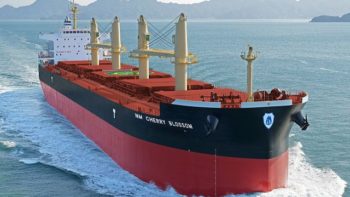
A South African court ruled on Thursday that a seized ship carrying a Moroccan cargo of phosphate from the disputed Western Sahara should remain in port until the case goes to trial or security is posted, a lawyer for the Polisario independence movement said.
The Polisario Front alleges the 50,000 tonne shipment en route to New Zealand was illegally taken from Western Sahara territory and went to court to have the cargo seized.
The case is a test of Polisario’s new legal tactic in its long-running conflict with Morocco over Western Sahara, a disputed territory where the two sides fought a war until a 1991 ceasefire and where U.N. talks have failed to reach an accord.
The Marshall Island-flagged NM Cherry Blossom was detained under a civil maritime court order in South Africa’s Port Elizabeth last month as part of Polisario’s attempt to take advantage of a European court ruling last year that Western Sahara should not be considered part of Morocco in EU and Moroccan deals.
The ship was carrying 50,000 tonnes of phosphate to New Zealand from Laayoune in the Moroccan-controlled part of the disputed territory for Morocco’s OCP phosphate export company.
“It will take some months before any trial can be heard,” said Andre Bowley, lawyer for the Polisario Front in South Africa.
“For the foreseeable future the ship remains exactly where it is until our court case is determined or someone puts up security,” he told Reuters of the cargo valued at around $5 million.
While the case must still go to trial, Polisario called the initial court decision a victory.
“This is a historic moment for the Saharawi people and we hope the final judgment will contribute to the protection of our natural resources,” said Kamal Fadel, a Polisario representative.
OCP, the world’s leading phosphate exporter, said the South African court decision contradicted international law. Polisario’s complaint was “a political matter disguised as a legal claim,” it said in a statement.
A Panama court this month dismissed another case by the Polisario to block a phosphate cargo in Panama, saying there was no evidence it belonged to the group and that a domestic court was not the venue to judge political matters.
The Port Elizabeth High Court said the core of the case was whether the Polisario movement had made a prima facie case that it owned the phosphate cargo and for an interim order granted in May to stand.
It ordered that the five respondents, including the owner of the ship, the buyer of the cargo and OCP, were restrained from removing the cargo.
